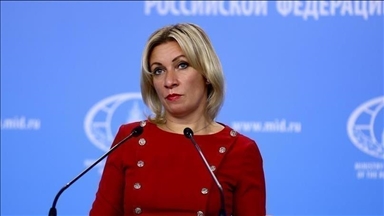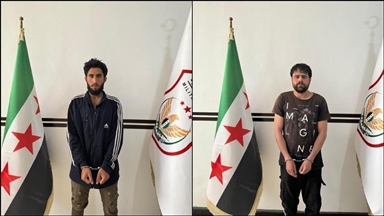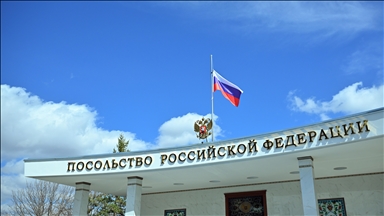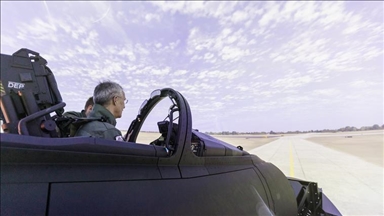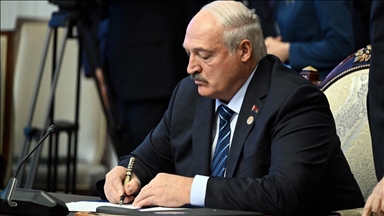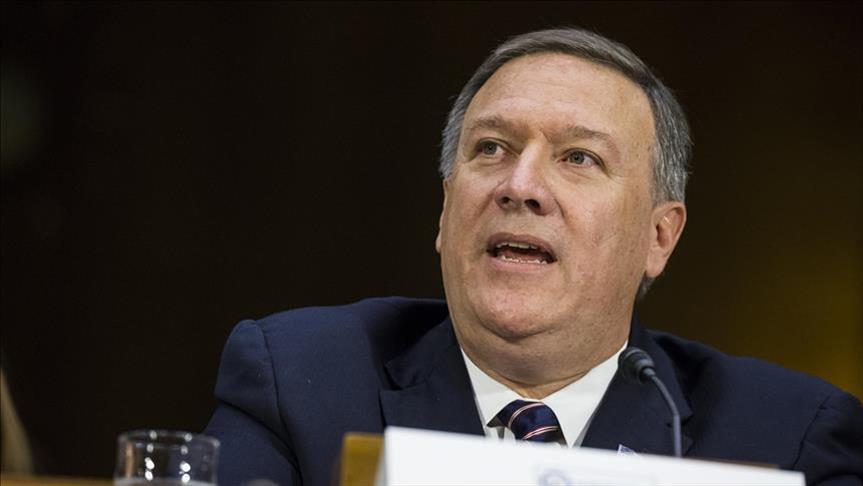
By Safvan Allahverdi
WASHINGTON
Current CIA director and secretary of state nominee Mike Pompeo faced a barrage of questions from members of the Senate Foreign Relations Committee at a confirmation hearing Thursday.
Both Republican and Democratic senators were eager to find out his thoughts on issues such as Russia, Iran, Syria and North Korea as well as his stance on Muslims living in the U.S.
After facing a small group of protesters against his nomination in the hearing room due to his hawkish background, Pompeo answered questions on a number of issues.
While he declined to comment on the latest developments in Syria, he said the goal there is to establish a post-Assad period and reach a diplomatic solution in order to restore peace and end the violence.
Pompeo also defined the Bashar al-Assad regime as a threat to human rights, regional stability and U.S. national security.
Asked whether President Donald Trump should get Congressional approval before striking Syria, he said the president has the authority to make the decision according to Article Two of the Constitution, which defines the president as the commander-in-chief of the army and navy.
Speaking about Russia, Pompeo claimed the reason for its aggressive behavior is due to the implementation soft politics towards Moscow.
"So there is still more work to be done on CAATSA,” he said, referring to the Countering America's Adversaries Through Sanctions Act. “There is more work to be done on other sanctions provisions as well.”
"But it hasn’t just been sanctions[...] This administration announced a Nuclear Posture Review that has put Russia on notice that we're going to recapitalize our deterrence force in Syria," he said.
He also recalled the U.S.-led anti-Daesh coalition's air strike near the Syrian city of Deir ez-Zor that left "a couple hundred Russians" dead as another example of the Trump administration's response to Russia.
In contrast to former Secretary of State Rex Tillerson, Pompeo said he agrees with Trump over the threat that North Korea poses.
"The president has made clear, and I agree with him, that there may come that day. There may come the day when we see an arsenal of nuclear weapons capable of striking the United States America," he said in response to a question about his stance on North Korea.
"The president has made clear his intention to prevent that from happening, and to the extent that diplomatic tools and other tools that America has as its foreign policy power are unsuccessful," I know that [Defense] Secretary Mattis has been directed to present to the president a set of options that will achieve the president's objective," he noted, adding that other steps beyond diplomatic efforts may need to be taken.
Turning to questions about Iran, he said he shares Trump’s view on “fixing” the Iran nuclear deal or withdrawing from it by May 12.
Iran has paid too low a price for its dangerous behavior and long-term plans against Iran need to be made, said Pompeo.
Senate Foreign Relations Committee Chairman Bob Corker also asked for clarification on what would happen after Trump withdraws on May 12.
“Your sense is should that happen, then you would continue after that time to try to create a better agreement?” said Corker.
“Yeah, senator, the president has stated his objective. I’ve heard him say it to my predecessor, to Secretary Tillerson, I’ve heard him say it. His goal is to take the three shortcomings and fix them,” Pompeo responded.
Along with his thoughts on U.S. foreign policy, one of the questions Pompeo had to address was about his previous remarks against Muslims and Islam.
Pompeo argued that he has worked with people holding a wide range of beliefs and opinions in his previous assignments and said he has not discriminated against anyone.
As the only two Muslim members of Congress, Democratic Reps. Keith Ellison and André Carson called on leaders of the Senate Foreign Relations Committee to oppose the confirmation of Pompeo as secretary of state, citing his "history of anti-Muslim sentiment and discrimination".
"Mr. Pompeo will regularly be required to liaise with Muslim leaders and Muslim communities abroad, especially during this time of conflict, tension and unprecedented humanitarian need throughout much of the world," Ellison and Carson wrote in a letter to Corker and the committee’s top Democrat, Bob Menendez.
"We need a credible secretary of state, not one hobbled by a history of anti-Muslim sentiment and discrimination," the letter said. "We thus urge you to oppose Mr. Pompeo's confirmation as secretary of state."
Pompeo, who has a long record of anti-Muslim statements, took part in think tanks and radio shows that actively promoted anti-Muslim policies.
As one example of his remarks, after the 2013 Boston Marathon bombing, Pompeo suggested that Muslim leaders who did not condemn the attack are potentially complicit in it.



